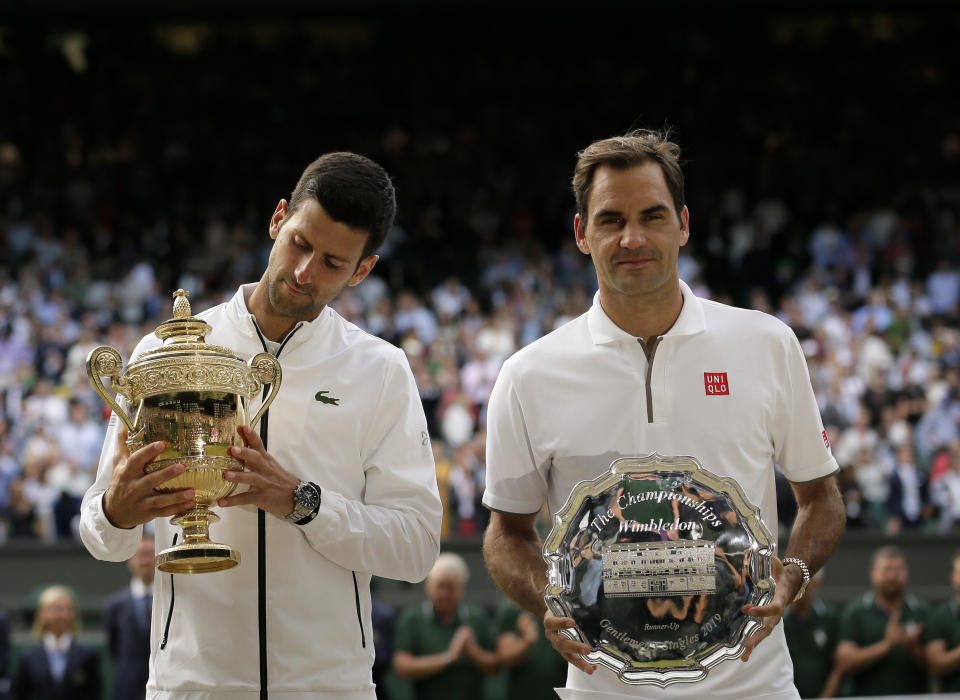Djokovic's mental fortitude shines through against Federer, Wimbledon crowd

WIMBLEDON — In the moments that were the most tense, it was Novak Djokovic who was too cool for even calmness personified himself, Roger Federer.
First, when Federer looked in complete command with a 5-3 lead in the first-set tie break after winning four straight points, Djokovic dug deep, staying mistake-free while daring Federer to be brave. Errors flew off the 20-time Grand Slam champion’s racquet and four straight points later, Djokovic took a one-set lead.
After an indifferent second set from the World No. 1, the third would also come down to a tie breaker, with Djokovic pulling through once again. Federer ramped his game up a notch to force a deciding fifth. And that’s when a match that had provided drama, intrigue and brilliance at full tilt saw its most inexplicable, jaw dropping, unfathomable moments.
8-7, 40-15 to Federer with the opportunity to close out a ninth Wimbledon title on his racquet. Djokovic saved the first, and then the second with a crosscourt forehand as Federer approached the net, one that went wide or crashing into the net repeatedly over the course of the match. Djokovic broke back, and it felt like deja vu all over again.
In the 2011 U.S. Open semifinal, Federer had two match points serving at 5-3 in the fifth. Djokovic hit a return winner, then watched a Federer forehand sail wide. He won that game, then three more in a row to win the match. In 2010, he did the same in the fifth.
“That was one thing that I promised myself coming onto the court today, that I need to stay calm and composed because I knew that the atmosphere will be as it was,” Djokovic said at his post-championship press conference. “It was probably the most demanding, mentally, most demanding match I was ever part of.”
Having had a look at each other’s serves for more than five sets, each was barely hanging on to add to the tension. Every point felt like a decisive blow, but over and over they kept delivering. And so it came down to the first ever 12-all tie breaker in the fifth to decide the winner at Wimbledon, the drama of fans whispering in the crowd as they checked their phones and relayed updates of England attempting to win their first ever Cricket World Cup creating great theatre.
But if there was a part of this match that wouldn’t offer much mystery, it was the tie break. Djokovic prevailed for a third time on the day and the match ended with Federer winning six games in each of the first four sets, 12 in the final set and still coming out on the losing side. The oldest Gentlemen’s Singles finalist since 1974 finished with more aces, less double faults, had a higher percentage of first and second serves won, broke serve four more times than his opponent, hit 40 more winners and won 14 more points in total.
“It really doesn’t matter, actually,” Federer said when asked if he felt he was the better player on the day. “I know what I did well, how close it was. I don’t need to feel that way. I think I can be happy about my performance.”
In a match like this, the stats don’t dictate moments, and Djokovic’s ability to not only recognize them but capitalize is what made the difference.
“There’s not a specific formula to find courage, at least from my perspective,” Djokovic said. “You can go all out and just close your eyes and just hit the ball as hard as you can, you can call that courage. But I wouldn’t necessarily call it courage in some particular situations...
“But I think there is always this self-belief. You have to keep reminding yourself that you’re there for a reason and that you are better than the other guy. As hard as the moment is that you are in, the more you have to remind yourself, the more you have to talk to yourself.”
When the match ended, Djokovic was muted in his celebration and said it had more to do with relief that the match was over with, but one can’t help but feel that he may have embraced the crowd a bit more if they had done more to endear themselves to him during the match.
When Federer broke back against Djokovic early in the fifth, the 15,000-plus in attendance became deafening. When Federer hit a forehand that was called wide but ruled in via a challenge, the crowd booed vociferously as Djokovic went to the chair umpire searching for an explanation for why the point had been awarded to Federer instead of being replayed. There were even some boos when he left for a bathroom break to regroup at the end of the second set.
For years now, Djokovic has been forced into the role of spoilsport. The one who gets in the way of the ones tennis fans really love, Federer and Rafael Nadal. While the latter two have won the crowd in different ways — one with grace and class, the other with raw passion and courage — Djokovic has been viewed as the icy one who has never quite been able to connect. Ask spectators at Murray Mount/Henman Hill what they make of his post-match celebration of extending his arms out to the crowd in all four directions and most will find it “cheesy” and “off-putting.”
But he cannot be ignored. With his 16th Grand Slam title, he is now within four — the closest he’s ever been — to Federer’s total, and two back of Nadal. His fifth Wimbledon title also puts him in an elite class, tying Bjorn Borg and trailing just Pete Sampras (7) and Federer (8).
“Whether I’m going to be able to do it or not, I don’t know,” Djokovic said when asked about getting closer to his rivals. “I mean, I’m not looking at age as a restriction of any kind for me, at least. What I said on the court, I really meant it: Roger really inspires me with his effort at his age.
“It just depends how long I’m going to play... it depends not only on myself, it depends on circumstances in life. I’m not just a tennis player, I’m a father and a husband. You have to balance things out. Obviously, you need the right circumstances, the right support for things to play out the right way.”
Right now, in the present where Djokovic likes to be, he’s got everything but the crowd going for him. That’s what has made him so mentally strong to this point, and that’s what could be the difference in where he stands when it’s all said and done.

 Yahoo Sports
Yahoo Sports 


